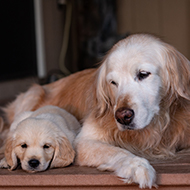
“The language we use to describe dogs and consider their age matters.” Dr Naomi Harvey.
New research from Dogs Trust has suggested that most dogs are not necessarily in the age category that we think they are.
Dr Naomi Harvey, research manager at Dogs Trust and honorary associate professor of Companion Animal Behaviour and Welfare at The University of Nottingham, conducted a review of existing scientific publications to assess what age a dog can be considered a puppy, juvenile, adult, senior or geriatric.
She said: “It’s common to read statements that say dog breeds age at different speeds, with some dog breeds ageing much faster or slower than others. But I wanted to look at whether this is really true.”
Dr Harvey's review concludes that there is evidence to suggest that a one-year-old dog is still juvenile just exiting puberty, and dogs don’t become mature adults – equivalent to humans are around age 25 – until they reach two years old.
The review also concluded that dogs can be considered to be entering their senior years at age seven, and that they can be classified as geriatric at age 12 and over.
Currently, it is common to adjust a dog’s age category by their breed life expectancy, as some breeds have far shorter lifespans than others. Dr Harvey argues that, based on evidence for how dogs age behaviourally, this is inaccurate and masks health and welfare issues associated with certain dog breeds.
She said: “But whilst their bodies may be impacted by health problems when they’re still young, there’s no evidence that short lived breeds are ageing in the true sense of the word, as behaviourally they appear to be following the same trajectory as other dogs.
“In other words, short lived dog breeds are not ageing faster, they are simply dying younger.”



 The veterinary mental health charity Vetlife is inviting the veterinary community to join it for a sponsored cold-water dip.
The veterinary mental health charity Vetlife is inviting the veterinary community to join it for a sponsored cold-water dip.